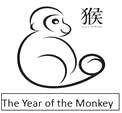题型:阅读表达 题类:常考题 难易度:困难
北京市通州区2016届九年级上学期英语期末学业水平质量检测试卷
阅读短文,根据短文内容回答问题。
Chinese Culture
While China is almost the same size as the US in area, it is home to about 1.3 billion people. It has a special culture with a very long history.
Chinese Food

Food plays an important role for Chinese families. Different foods have special meanings. The most obvious(明显的) difference is that Chinese people eat their meals with chopsticks. One of the main foods in Chinese culture is rice. Tea is a favorite drink and it is popular in the market.
Chinese New Year
The Chinese calendar(日历) is called a lunar(阴历的) calendar. It is not the same as the one used in the US. New Year's Day is in late winter. It is also called the Spring Festival. It has a big celebration of letting go of the old and bringing in the new. It has special foods and traditions. For example, sweeping the floor before New Year's Day sweeps away all the old year's bad luck.
Chinese Zodiac(生肖)

The Chinese zodiac, known as Sheng Xiao, follows a twelve-year cycle(循环). Each year is named for an animal. These animal signs are the rat, ox, tiger, rabbit, dragon, snake, horse, sheep, monkey, rooster, dog and pig. For example, the year that begins in 2016 is the Year of the Monkey.
Chinese Language
Chinese is a complex(复杂的) language. Chinese writing developed almost 4,000 years ago and may even be older. Chinese writing has thousands of characters. A character represents(代表) a word and also a meaning. Unlike English, there are no spaces in Chinese writing. Besides Standard Chinese, or Putonghua, Chinese people speak six other forms of the language, and there are many kinds of dialects(方言).
When you are sick, you can hardly go to places, see friends or do sports—it's not fun at all. So follow these steps to get better quickly.
{#blank#}1{#/blank#}Unhealthy food can make you even sicker. Eat healthy food like fruit and vegetables when you are sick.
{#blank#}2{#/blank#}You can use a soft, warm blanket(毛毯) and stay in bed. Drink hot water or soup to help you keep warm.
{#blank#}3{#/blank#} Medicine can help the body when you are sick. If your doctor gives you some medicine, be sure to take it.
{#blank#}4{#/blank#} You need 8 or 9 hours of sleep or more, so be sure to get enough sleep at night.
{#blank#}5{#/blank#}Go outside on a nice day to get more fresh air. Take a book with you and do some reading when you enjoy the sunshine.
|
A. Make sure you stay warm. B. Get some fresh and clean air. C. Lie down and get some rest. D. Don't eat unhealthy food. E. Take some medicine. F. Go to see the doctor quickly. |
试题篮